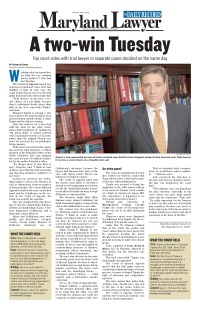Oku v. State
The Court of Appeals of Maryland affirmed the ruling of a Montgomery County Circuit Court judge allowing voluntary testimony from a criminal defendant’s District Court trial to be used in the State’s case-in-chief during his Circuit Court trial. The Petitioner was accused of attacking a man while in an elevator in Silver Spring, Maryland. He was charged with second degree assault and reckless endangerment in the District Court of Maryland in Montgomery County. Petitioner, represented by an attorney, took the stand in his own defense.
During his trial, he admitted to punching the victim in the face once and hitting him once. It is undisputed that Petitioner’s District Court testimony was given voluntarily.[1] At the end of his District Court trial, Petitioner was convicted of both the second degree assault and reckless endangerment charges. Petitioner exercised his right to a de novo appeal in the Circuit Court for Montgomery County.
Before the start of Petitioner’s Circuit Court trial, Petitioner made a motion in limine arguing that the Court should preclude the introduction of Petitioner’s District Court testimony during his trial. The Court denied Petitioner’s motion. After the victim’s in-court identification of the Petitioner, the State, over Petitioner’s objection, introduced a recording of the Petitioner’s District Court testimony into evidence.[2] Petitioner asserted that his Fifth Amendment privilege against self-incrimination[3] and the nature of the de novo trial prohibited his District Court testimony from coming in during the State’s case-in-chief. Further, Petitioner asserted that the Circuit Court judge’s ruling relieved the State of its burden to put on its case a second time.
However, in ruling against Petitioner’s objection, the Court noted that Maryland’s de novo statutory scheme “does not call for exclusion of testimony voluntarily given in district court trial, as long as it is admissible under rules of evidence.”[4] In explaining its holding, the Court of Appeals of Maryland reasoned that while the structure of the de novo appeal system does have the effect of ignoring the judgment below, it does not allow for the complete erasure of the defendant’s voluntary testimony.
[1] See Oku v. State, page 2 (2013) available at http://www.mdcourts.gov/opinions/coa/2013/59a12.pdf.
[2] Id. The parties stipulated that “there was a prior trial below at which the defendant testified that he was the person on the elevator, that he struck Mr. Mijango [twice], and that he wasn’t in fear – – in other words, there was no self defense issue.”
[3] See U.S. Const. am. V. “No person shall . . . be compelled in any criminal case to be a witness against himself . . .” (The Court of Appeals of Maryland reasoned that “Petitioner’s District Court testimony, not compelled at the time it was given, did not transform into compelled testimony when later introduced in Circuit Court” thereby not offending the Fifth Amendment).
[4] Id. at 2.






Leave a Reply